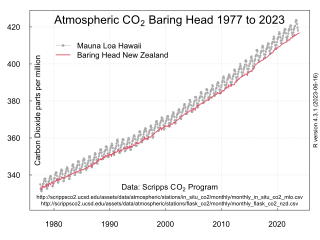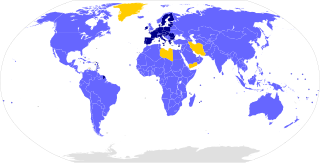
Nicolas Rex Smith is a New Zealand politician who served as a Member of Parliament (MP) for the National Party from 1990 to 2021. He served as a Cabinet minister, holding various posts including Minister for Building and Housing, Minister for the Environment, Minister for Climate Change Issues, and Minister of Local Government. For a brief time between October and November 2003 he was the deputy leader of the National Party, then in opposition under Don Brash.

Carbon offsetting is a carbon trading mechanism that allows entities such as governments or businesses to compensate for (i.e. “offset”) their greenhouse gas emissions. It works by supporting projects that reduce, avoid, or remove emissions elsewhere. In other words, carbon offsets work by offsetting emissions through investments in emission reduction projects. When an entity invests in a carbon offsetting program, it receives carbon credits. These "tokens" are then used to account for net climate benefits from one entity to another. A carbon credit or offset credit can be bought or sold after certification by a government or independent certification body. One carbon offset or credit represents a reduction, avoidance or removal of one tonne of carbon dioxide or its carbon dioxide-equivalent (CO2e).

The Climate Change Act 2008 is an Act of the Parliament of the United Kingdom. The Act makes it the duty of the Secretary of State to ensure that the net UK carbon account for all six Kyoto greenhouse gases for the year 2050 is at least 100% lower than the 1990 baseline, toward avoiding dangerous climate change. The Act aims to enable the United Kingdom to become a low-carbon economy and gives ministers powers to introduce the measures necessary to achieve a range of greenhouse gas reduction targets. An independent Committee on Climate Change was created under the Act to provide advice to UK Government on these targets and related policies. In the act Secretary of State refers to the Secretary of State for Energy and Climate Change.
The Climate Change Committee (CCC), originally named the Committee on Climate Change, is an independent non-departmental public body, formed under the Climate Change Act (2008) to advise the United Kingdom and devolved Governments and Parliaments on tackling and preparing for climate change. The Committee provides advice on setting carbon budgets, and reports regularly to the Parliaments and Assemblies on the progress made in reducing greenhouse gas emissions. Notably, in 2019 the CCC recommended the adoption of a target of net zero greenhouse gas emissions by the United Kingdom by 2050. On 27 June 2019 the British Parliament amended the Climate Change Act (2008) to include a commitment to net zero emissions by 2050. The CCC also advises and comments on the UK's progress on climate change adaptation through updates to Parliament.

Despite abundant natural resources and a relatively small population, New Zealand is a net importer of energy, in the form of petroleum products. The ratio of non-renewable and renewable energy sources was fairly consistent from 1975 to 2008, with about 70 per cent of primary energy supply coming from hydrocarbon fuels. This ratio decreased to about 60 per cent in 2018. The proportion of non-renewable energy varies annually, depending on water flows into hydro-electricity lakes and demand for energy. In 2018, approximately 60% of primary energy was from non-renewable hydrocarbon fuels and 40% was from renewable sources. In 2007 energy consumption per capita was 120 gigajoules. Per capita energy consumption had increased 8 per cent since 1998. New Zealand uses more energy per capita than 17 of 30 OECD countries. New Zealand is one of 13 OECD countries that does not operate nuclear power stations.

Climate change in New Zealand involves historical, current and future changes in the climate of New Zealand; and New Zealand's contribution and response to global climate change. Summers are becoming longer and hotter, and some glaciers have melted completely and others have shrunk. In 2021, the Ministry for the Environment estimated that New Zealand's gross emissions were 0.17% of the world's total gross greenhouse gas emissions. However, on a per capita basis, New Zealand is a significant emitter, the sixth highest within the Annex I countries, whereas on absolute gross emissions New Zealand is ranked as the 24th highest emitter.

The New Zealand Emissions Trading Scheme is an all-gases partial-coverage uncapped domestic emissions trading scheme that features price floors, forestry offsetting, free allocation and auctioning of emissions units.

The Climate Change Response Act 2002 is an Act of Parliament passed by the New Zealand Government.
The Climate Change Response Amendment Act 2008 was a statute enacted in September 2008 by the Fifth Labour Government of New Zealand that established the first version of the New Zealand Emissions Trading Scheme, a national all-sectors all-greenhouse gases uncapped and highly internationally linked emissions trading scheme. After the New Zealand general election, 2008, the incoming National-led government announced that a Parliamentary committee would review the New Zealand emissions trading scheme and recommend changes. Significant amendments were enacted in November 2009. Obligations for pastoral agriculture were further delayed. Obligations for energy and industry were halved via a "two for one" deal. Free allocation of units to industry was made uncapped and output based and with a slower phase-out. A price cap of $25 NZD per tonne was introduced.
The Emissions Trading Scheme Review Committee was a special committee of the New Zealand Parliament which conducted a review of the Fifth Labour Government's Emissions Trading Scheme between December 2008 and late August 2009.

The Paris Agreement, often referred to as the Paris Accords or the Paris Climate Accords, is an international treaty on climate change. Adopted in 2015, the agreement covers climate change mitigation, adaptation, and finance. The Paris Agreement was negotiated by 196 parties at the 2015 United Nations Climate Change Conference near Paris, France. As of February 2023, 195 members of the United Nations Framework Convention on Climate Change (UNFCCC) are parties to the agreement. Of the three UNFCCC member states which have not ratified the agreement, the only major emitter is Iran. The United States withdrew from the agreement in 2020, but rejoined in 2021.

Climate change has resulted in an increase in temperature of 2.3 °C (2022) in Europe compared to pre-industrial levels. Europe is the fastest warming continent in the world. Europe's climate is getting warmer due to anthropogenic activity. According to international climate experts, global temperature rise should not exceed 2 °C to prevent the most dangerous consequences of climate change; without reduction in greenhouse gas emissions, this could happen before 2050. Climate change has implications for all regions of Europe, with the extent and nature of impacts varying across the continent.

Mojo Celeste Mathers is a New Zealand politician and a former Member of Parliament (MP) for the Green Party. She became known through her involvement with the Malvern Hills Protection Society and helped prevent the Central Plains Water Trust's proposal to build a large irrigation dam in Coalgate. She was a senior policy advisor to the Green Party between 2006 and 2011. Mathers was elected to the 50th term of Parliament in 2011, becoming the country's first deaf Member of Parliament.

The Climate Change (Scotland) Act 2009 is an Act of the Scottish Parliament. The Act includes an emissions target, set for the year 2050, for a reduction of at least 80% from the baseline year, 1990. Annual targets for greenhouse gas emissions must also be set, after consultation the relevant advisory bodies.

Roderick Marshall Carr is a New Zealand businessman and administrator. He retired from his position as Vice-Chancellor of the University of Canterbury in 2019 and has been a chairman of the board of the Reserve Bank of New Zealand, and a director of Lyttelton Port Company, Taranaki Investment Management and Canterbury Employers’ Chamber of Commerce. In 2019, Carr was appointed as Chair-designate for the Climate Change Commission and has been confirmed in that role for five years following the passing of the Climate Change Response Amendment Act. Carr has been partially sighted and legally blind since birth.

The 52nd New Zealand Parliament was a meeting of the legislature in New Zealand, which opened on 7 November 2017 following the 2017 general election and dissolved on 6 September 2020. The New Zealand Parliament comprises the Sovereign and the House of Representatives, which consists of 120 members.

The Sixth Labour Government governed New Zealand from 26 October 2017 to 27 November 2023. It was headed first by Jacinda Ardern and later by Chris Hipkins, as Labour Party leader and prime minister.
The Interim Climate Change Committee is a ministerial advisory committee created by the New Zealand Government in mid–April 2018 to explore how New Zealand transitions to a net zero emissions economy by 2050. The Interim Committee was superseded and replaced by an independent Climate Change Commission under the Climate Change Response Amendment Act in November 2019.

A climate target, climate goal or climate pledge is a measurable long-term commitment for climate policy and energy policy with the aim of limiting the climate change. Researchers within, among others, the UN climate panel have identified probable consequences of global warming for people and nature at different levels of warming. Based on this, politicians in a large number of countries have agreed on temperature targets for warming, which is the basis for scientifically calculated carbon budgets and ways to achieve these targets. This in turn forms the basis for politically decided global and national emission targets for greenhouse gases, targets for fossil-free energy production and efficient energy use, and for the extent of planned measures for climate change mitigation and adaptation.

The Climate Change Commission is an independent Crown entity that advises the New Zealand Government on climate change policy and monitors the government's progress towards New Zealand's emission reduction goals within the framework of the Climate Change Response Amendment Act. The Commission was established as the successor to the Interim Climate Change Committee following the passage of the Zero Carbon Act in November 2019.
















